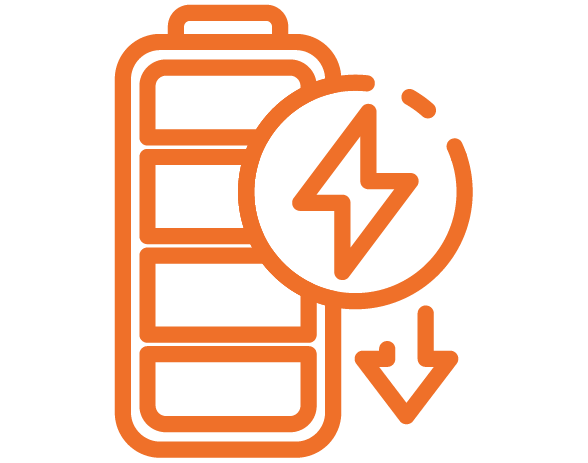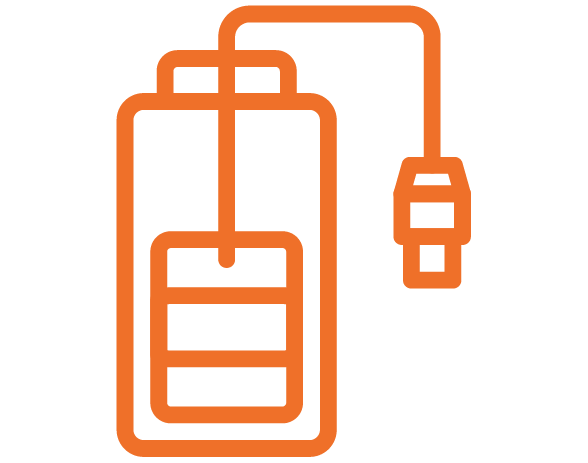Key Considerations
When ordering a custom LiPo battery, there are several key considerations to keep in mind to ensure the battery will meet your specific requirements and be safe for use in your application. Here are the most important factors:

Voltage (V)
Voltage is key to your battery's power output. With each LiPo cell offering 3.7V, it's vital to align your pack's voltage with your device's specifications for optimal performance.

Capacity (mAh)
Capacity reflects a battery's charge storage potential. Selecting the right capacity, from 2200mAh to 44,000mAh, depends on your device's operational duration needs.

Discharge Rate
(C-Rating)
The discharge rate, crucial for matching your device's energy demands, indicates how quickly a battery can discharge safely. Our range includes 20C to 100C cells for diverse power needs.

Configuration
Battery configuration in series boosts voltage, while parallel arrangements enhance capacity, offering flexibility for specific power requirements.

Dimensions and Shape
Considering your device's spatial constraints, selecting a battery with the appropriate dimensions and shape is essential for a seamless integration.

Connector Type
Matching the battery's connector to your device ensures efficiency and ease of use. Our selection ranges from the widely used XT60 to the high-demand AS150 connectors, catering to various application needs.
Why choose LiPo Batteries?
LiPo batteries excel with their high energy density and lightweight, flexible build, making them lighter and more compact than traditional batteries. Perfect for diverse UK applications, from custom industrial to heavy-duty tasks, they provide versatile, reliable power solutions. Their durability, low self-discharge, and thermal stability ensure consistent performance and safety, meeting UK standards for precision-engineered, efficient bespoke battery solutions.
Our Custom LiPo Battery Packs
At Overlander Industrial, we meet your unique requirements with a wide range of Lithium cells, tailored in capacity, discharge rate, and size. Our technology and detailed testing ensure each pack is perfectly balanced and top-quality. Specialising in ultrasonic welding, we offer durable connections and customisable leads and connectors with heat shrink wrapping for extra durability. Every pack includes a balance lead for guaranteed cell balance and extended lifespan, matching UK standards for bespoke battery solutions.
Bespoke LiPo Battery Construction

LiPo Battery Features

High-Energy Density
LiPo cells outperform other rechargeable batteries in energy density, offering enhanced energy storage in a more compact form.

Lightweight
LiPo cells outperform other rechargeable batteries in energy density, offering enhanced energy storage in a more compact form.

Low Self-Discharge
LiPo cells feature a low self-discharge rate, ensuring they maintain their charge over extended periods for long-lasting power.

High Discharge Rate
LiPo cells can discharge at high rates, making them optimal for high-performance applications that demand significant power output.

Range of Sizes and Shapes
LiPo batteries are available in diverse sizes, accommodating various applications with options for parallel and series configurations for tailored power solutions.
Possible Applications
.jpg)
Consumer Electronics
Drones and quadcopters, action cameras, electronic cigarettes and vaporisers, electric shavers and toothbrushes.
.jpg)
Medical Devices
Portable defibrillators, infusion pumps, patient monitoring systems, blood glucose meters and prosthetic devices.
.jpg)
Robotics
Unmanned aerial vehicles (UAVs), autonomous underwater vehicles (AUVs) and humanoid robot components.
.jpg)
Industrial Equipment
Handheld power tools, remote monitoring devices, portable measurement devices and remote sensors.

Lithium Polymer
LiPo batteries offer a range of benefits, including a high energy density and lightweight design, making them ideal for portable electronic devices. They can also provide high discharge rates, making them popular in the hobbyist electronics market for drones, remote control cars, and more. With proper handling and maintenance, LiPo batteries can offer reliable and efficient power solutions for a variety of applications.
Data Sheets
Filter by:
Capacity
Voltage
Constant Discharge
Dimensions
Weight
Download
Burst Discharge
Frequently Asked Questions
When handled properly, LiPo batteries are generally considered safe. However, like any battery, LiPo batteries can be dangerous if mishandled or abused. Overcharging, puncturing, crushing, or exposing a LiPo battery to extreme temperatures can cause it to catch fire or explode.
It's important to follow the manufacturer's instructions for use and storage and to avoid physical damage to the battery. It is also recommended to use a charger specifically designed for LiPo batteries and to never leave a charging battery unattended.
The lifespan of a LiPo battery depends on various factors such as usage, storage conditions, and maintenance. Generally, a well-maintained LiPo battery can last for hundreds of charge and discharge cycles. However, over time, the battery's capacity will decrease, resulting in shorter run times. It is important to monitor the battery's performance and replace it if it shows signs of damage or decreased capacity.
Here are some tips to help extend the lifespan of your LiPo battery:
-
Store your battery at room temperature and avoid exposing it to extreme temperatures.
-
Avoid overcharging or discharging your battery. Use a charger specifically designed for LiPo batteries and do not leave your battery charging unattended.
-
Do not puncture or damage the battery in any way, and avoid exposing it to water or other liquids.
-
If you are not going to be using your battery for an extended period of time, store it at around a 50% charge level.
-
Use a battery monitoring system to check the voltage and health of your battery regularly.
-
If you notice any swelling or deformation of the battery, stop using it immediately and dispose of it safely.
-
To safely store and transport LiPo batteries, follow these guidelines:
-
Store batteries in a cool, dry place away from direct sunlight, heat sources, and flammable materials.
-
Keep batteries in a fireproof container or bag designed for LiPo batteries.
-
Avoid storing or transporting batteries with metal objects or conductive materials, which can short-circuit the battery.
-
Do not crush, puncture, or damage the battery in any way.
-
Always transport batteries in your carry-on luggage when traveling by plane, and follow airline regulations for LiPo batteries.
-
If a battery becomes damaged or begins to swell, dispose of it properly according to local regulations.
-
LiPo batteries are typically charged using a specialised LiPo battery charger, which ensures that the battery is charged to the appropriate voltage and current level. It is important to use a charger specifically designed for LiPo batteries, as charging them improperly can lead to damage, reduced performance, or even a risk of fire or explosion. LiPo batteries should always be charged in a fireproof charging bag or container, and never left unattended during the charging process.
If a LiPo battery gets damaged, it should be handled with extreme caution as damaged batteries can be potentially dangerous. It is recommended to place the damaged battery in a fireproof container and avoid using it again. It is important to dispose of the battery properly according to local regulations.
LiPo batteries should not be disposed of in the regular household waste as they can pose a potential fire hazard if not handled properly. Instead, they should be taken to a designated battery recycling facility, where they can be safely disposed of and recycled. Many electronic stores and recycling centers offer battery recycling programs for consumers to safely dispose of their used batteries.
We also offer a battery takeback scheme as part of our battery recycling initiative with BatteryBack and WeeeCare.
